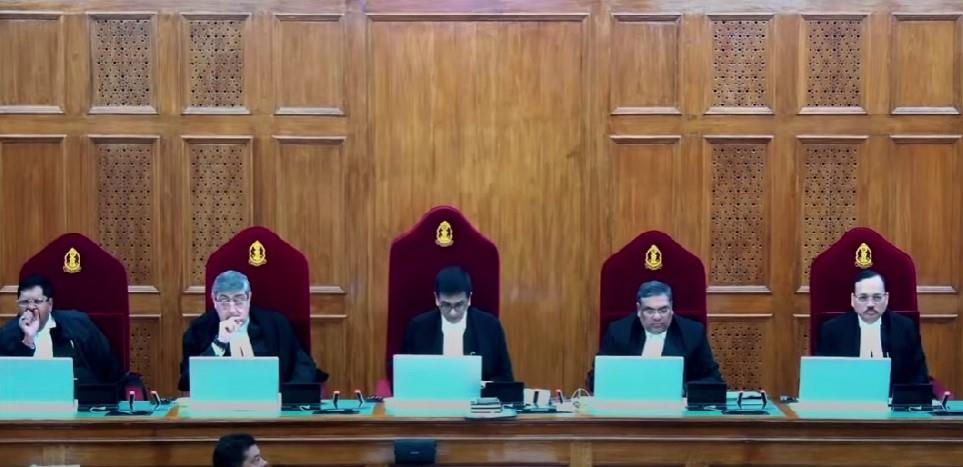Article 370 was a temporary provision, says CJI as Bench pronounces verdict

Satya Prakash
New Delhi, December 11
The Supreme Court on Monday upheld the government’s decision to abrogate Article 370, which bestowed special status on the erstwhile state of Jammu and Kashmir, and said steps should be taken to conduct elections in the assembly by September 30 next year.
Related News
- Amit Shah welcomes Supreme Court verdict upholding abrogation of Article 370
- PM Modi calls SC’s verdict on J-K historic
- Omar Abdullah expresses disappointment over SC verdict on Article 370
- Supreme Court verdict sad and unfortunate; but we have to accept it: Ghulam Nabi Azad
- Mehbooba Mufti put under ‘house arrest’ ahead of Supreme Court verdict on Article 370
- Reports of house arrest or arrest of anyone ahead of SC verdict on Article 370 totally baseless: L-G Manoj Sinha
- Challenging abrogation of Article 370: Timeline of developments in the case
Writing the judgement for himself and Justices Gavai and Surya Kant, Chief Justice of India DY Chandrachud said Article 370 of the Constitution was a temporary provision and the President has the power to revoke it.
The apex court also upheld the validity of the decision to carve out the union territory of Ladakh from Jammu and Kashmir in August 2019.
The CJI said there are limitations on powers of Parliament while President’s Rule is in place in a state.
The State of Jammu and Kashmir didn’t retain any element of sovereignty when Maharaja Hari Singh signed an Instrument of Accession with India, ruled the SC Constitution Bench.
Jammu and Kashmir does not hold any internal sovereignty after accession to Union of India, ruled the Bench.
The SC declared that Article 370 was a temporary provision of the Indian Constitution.
The CJI said Article 370 was an interim arrangement due to war conditions in the state.
The SC ruled that Jammu and Kashmir Constituent Assembly was never intended to be a permanent body and its recommendations were not binding on the President.
When the Constituent Assembly of Jammu and Kashmir ceased to exist, the special conditions for which Article 370 was introduced ceased to exist but Article 370 had continued due to the situation in the state, said the CJI.
The CJI said the interpretation clause cannot be modified to amend the Article bypassing the amendment process.
“We have, therefore, held the amendments made to Article 370 by taking recourse to Article 367 as ultra vires,” said the CJI.
The CJI said interpretative clause cannot be used to bypass the specific route for a constitutional amendment. Permitting such amendments by such a surreptitious method would be disastrous.
On validity of J&K Reorganisation Act, 2019, the CJI said Solicitor General Tushar Mehta had submitted that statehood of J&K will be restored and the status of UT was temporary. In view of the submission made by the SG, we don’t find it necessary to determine whether the reorganisation of J&K into UT is valid.
The reorganisation of Ladakh as Union Territory is upheld as Article 3 allows a portion of the state to be made as UT, the CJI said.
The question whether Parliament can convert a state into a Union Territory is left open, the CJI said.
The SC directed the Election Commission to conduct election in J&K by September 2024.
While pronouncing his concurring judgement, Justice SK Kaul recommended setting up of a Truth and Reconciliation Commission to investigate human rights violations by the state and non-state actors in Jammu and Kashmir since the 1980s. However, he said the Commission must not turn into a criminal court and that it should offer a platform for dialogue.
Conclusions of SC verdict on Article 370
*Jammu and Kashmir does not retain any element of sovereignty after the Instrument of Accession was signed by Maharaja Hari Singh on October 26, 1947.
*After the signing of the Instrument of Accession no internal sovereignty was left with Jammu and Kashmir.
*Challenge to the proclamation of President’s Rule in Jammu and Kashmir prior to the constitutional changes is not valid.
*Exercise of power of the President must have a reasonable nexus with the object of President’s Rule.
*Power of Parliament to legislate for a state during President’s Rule cannot exclude law-making powers.
*Article 370 of the Constitution was a temporary and transient provision.
*When Constituent Assembly of Jammu and Kashmir was dissolved, only the transitory power of the assembly ceased to exist and no restriction on Presidential order.
*Para 2 of the Constitution (Application to Jammu and Kashmir) Order, 2019 (OC 272) by which Article 370 was amended by amending article 367 was ultra vires as interpretation clause cannot be used for amendment.
*President use of power was not mala fide and no concurrence needed with state.
*Para 2 of Constitution Order 272 in exercise of power under Article 370(1)(d) applying all provisions of Indian constitution to Jammu and Kashmir declared valid.
*The continuous exercise of power by the President shows the gradual process of integration was ongoing. Thus the Constitution (Application to Jammu and Kashmir) Order, 2019 (CO 273) is valid.
*The Constitution of Jammu and Kashmir is declared to have become redundant.
*Presidential use of power not mala fide.
*The decision to carve out the Union Territory of Ladakh was upheld.
*CJI refers to the Solicitor General’s statement during the hearing that statehood will be restored to Jammu and Kashmir; says statehood should be restored at the earliest.
*SC directs Election Commission to hold polls in Jammu and Kashmir by September 2024.
*Justice SK Kaul recommends setting up of a Truth and Reconciliation Commission to investigate human rights violations by the state and non-state actors in Jammu and Kashmir since the 1980s. However, he says the Commission must not turn into a criminal court and that it should offer a platform for dialogue.
